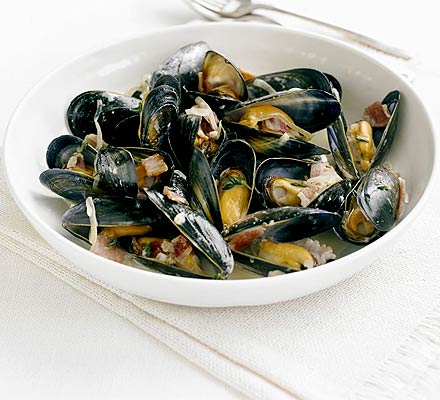Mussels steamed with cider & bacon
Contains pork – recipe is for non-Muslims only
Mussels are much easier dish to serve up than people realise. Try this easy dish, read the tips, and impress your friends
-
Prep:40 mins
Cook:20 mins
- Easy
Nutrition per serving
-
kcal 367
-
fat 18.6g
-
saturates 6.5g
-
carbs 8g
-
sugars 2g
-
fibre 0g
-
protein 39g
-
salt 4.45g
Ingredients
- small knob butter
- 6 rashers bacon, chopped, or a 140g piece, cut into small cubes
- 2 shallot, finely sliced
- small bunch thyme, leaves stripped
- 1½ kg small mussel, scrubbed and bearded
- glass of cider, about 150 ml
- 2 tbsp crème fraîche (optional)
Tip
Storing live musselsDon’t leave them wrapped in a plastic bag (they can suffocate), or soaking in water, as chemicals and the lack of salinity (salt) can also kill them. Instead, keep them in a bowl, lightly covered with damp kitchen paper, in the bottom of the fridge – not too cold or they won’t last as long. They can then last up to five days – although you should expect to lose quite a few over this length of time, so it’s best to eat them on the day of purchase.Buying the best
Mussels in the shell are sold either alive or pre-cooked. They’re available out of the shell as ‘mussel meat’, or brined or pickled in cans. For cooking, you really want live mussels in the shell. Farmed mussels are a particularly good buy as they are often more appealing to look at and require a lot less scrubbing under the tap to remove barnacles. Live mussels are often sold pre-weighed in a net bag, and should be kept cool on the way home.
Method
PREPARATION: Raw mussels MUST be alive when you cook them, so careful preparation is key. Wash them under cold running water until it runs clear, and scrub if necessary. Pull the ‘beard’ away from each individual mussel – this is the byssus thread, a protein the mussel ‘spins’ so it can attach itself to rock or rope. Drain and then check; if the shell is tightly shut, this is a good indication that it’s alive. If the mussel is open, tap it sharply for a few seconds – if it is alive, it will close. Discard any that appear to be dead as they can decompose very rapidly, and eating one that you aren’t sure of is not worth the risk. Don’t check them too far in advance; cook within a few minutes to be on the safe side.
Heat the butter in a pan large enough to easily fit the mussels, then fry the bacon for 4 mins, turning occasionally until it starts becoming crisp. Throw in the shallots and thyme leaves, then cook for 1 min until softened. Whack the heat up to maximum and add the mussels to the pan, then pour over the cider. Place the lid on the pan, give it a good shake, then cook the mussels for 5-7 mins, shaking the pan occasionally, until all the mussels have opened. Discard any that haven’t.
Use a slotted spoon to scoop the mussels into bowls and place the pan back on the heat. Bring the juices to the boil and stir in the crème fraîche, if using. Pour the sauce over the mussels. Serve with hunks of crusty bread for mopping up the sauce.
COOKING TIPS: Mussels are most often steamed open over a small amount of flavoured liquid, as in Moules marinière, although they can also be oven roasted and are particularly good cooked ‘en papillote’ (in a bag). Wine, stock, beer and cider are all great for cooking mussels, but take care not to add salt to the liquid as mussel juice can be very salty. Drop the mussels into the liquid, cover with a tight-fitting lid, then cook until they have opened and the meat has settled into one side of the shell; this usually takes 3-4 minutes. Avoid overcooking as the meat shrivels and becomes tough. Check them all again before serving and discard any that haven’t opened. If a mussel is unopened at this stage, this indicates that it was already dead. You will probably notice the colour of the meat varies between beige and orange. This is an indication of sex – beige for male and orange for female; there is no difference in flavour. Once cooked, mussels are usually lifted into a bowl and the cooking liquor is reduced by simmering. Pull the meat from one shell and then use that shell as a pincer to remove meat from the rest. Serve simply with crusty bread – lovely!





















